#jean-charles gautier
Explore tagged Tumblr posts
Note
(that last anon again) Thank you so much for the recommendations! I'm truly in awe of how well read you are and how thorough your answers are. May I ask if you have any fiction recommendations with the same themes?
(following on from this ask)
hi!! you're very kind, apologies for taking so long to get back to you! i've been snowed under with assignments+readings for uni and the slowly encroaching exam crawl... but yes absolutely♡
- The Story of O, Anne Desclos - The Bloody Chamber ; The Infernal Desire Machines of Doctor Hoffman ; The Passion of New Eve, Angela Carter -> Angela appreciated and referenced symbolist artists like Rops:
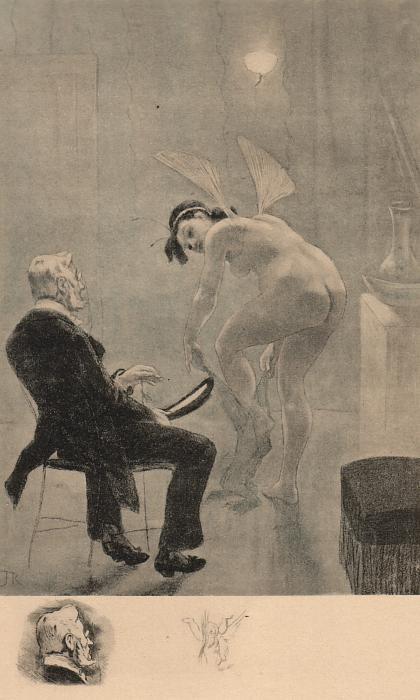
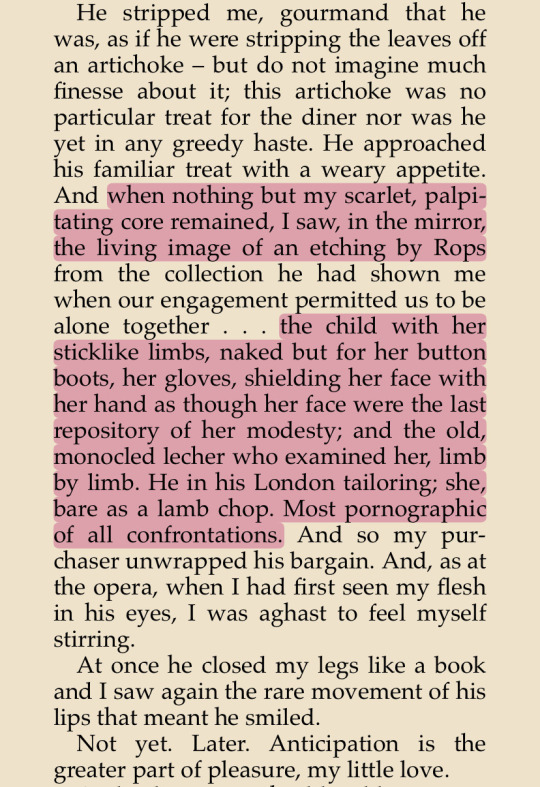

Woman Putting on Costume, 1848-1898, Rops; The Bloody Chamber, Angela Carter; excerpt from Romana Byrne's Aesthetic Sexuality: A Literary History of Sadomasochism (mentioned in previous ask) which seems esp pertinent given the Bloody Chamber is a Bluebeard tale (but which is actually referencing Story of O)
I also mentioned Giger in the previous ask, and Hans Bellmer was an influence of his whom I enjoy viewing alongside Rops...

this is Sans Titre (Jeune Fille et la Mort), 1963
- The Torture Garden, Octave Mirbeau
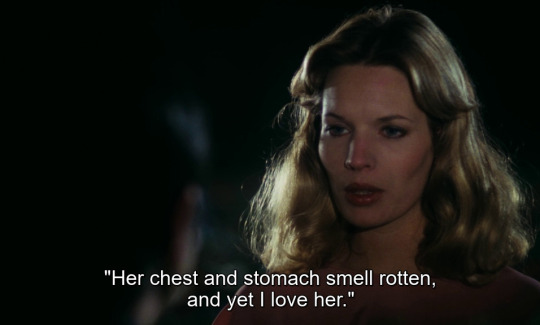
(Le Jardin des supplices (1976) dir. Christian Gion; screencap from estateofinsanity)
- Exquisite Corpse, Poppy Z. Brite - Necrophilia Variations, Supervert - Story of the Eye; My Mother, Madame Edwarda, The Dead Man; Blue of Noon, Bataille - Justine, or The Misfortunes of Virtue ; Juliette ; 120 Days of Sodom, Sade - The Claiming of Sleeping Beauty, Anne Rice -> supplement w Sleeping Beauty (2011) dir. Julia Leigh - Venus in Furs, Leopold von Sacher-Masoch - Monsieur Vénus, Rachilde - Le Necrophile, Gabrielle Wittkopp - The Apprenticeship of Big Toe P, Reiko Matsuura - The Damned ; Against Nature, Joris-Karl Huysmans - Empire of the Senseless, Kathy Acker - Crash, J.G. Ballard (+ the Cronenberg of course) - Salomé / Teleny, or the Reverse of the Medal, Oscar Wilde - La Morte Amoureuse, Théophile Gautier

^Romuald bitterly remembers his lost love, 1904, Eugène Decisy—his etchings for Gautier's story are beautiful (x, x)
- The Image, Jean de Berg - Trois Filles de leur mère, Pierre Louÿs - House of Incest, Anaïs Nin - My Dark Vanessa, Kate Elizabeth Russell - Naomi, Jun'ichirō Tanizaki - “Dolores”, Algernon Charles Swinburne:
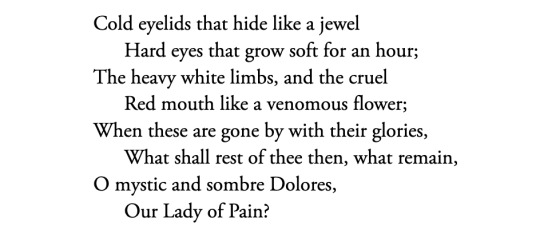
-> first of many stanzas^ ; I also like his “Laus Veneris” - Trouble Every Day (2001) dir. Claire Denis - Belladonna of Sadness (1963) dir. EIichi Yamamoto
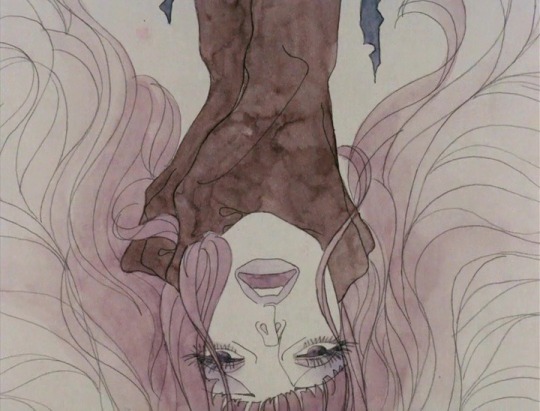
(screencap from eternal--return)
- Nekromantik (1988) dir. Jörg Buttgereit - Thirst (2009) dir. Park Chan-wook -> supplement w Zola's Thérèse Raquin and In Secret (2013) dir. Charlie Stratton
118 notes
·
View notes
Text
Photos from my Opera Garnier Trip 2 of 3
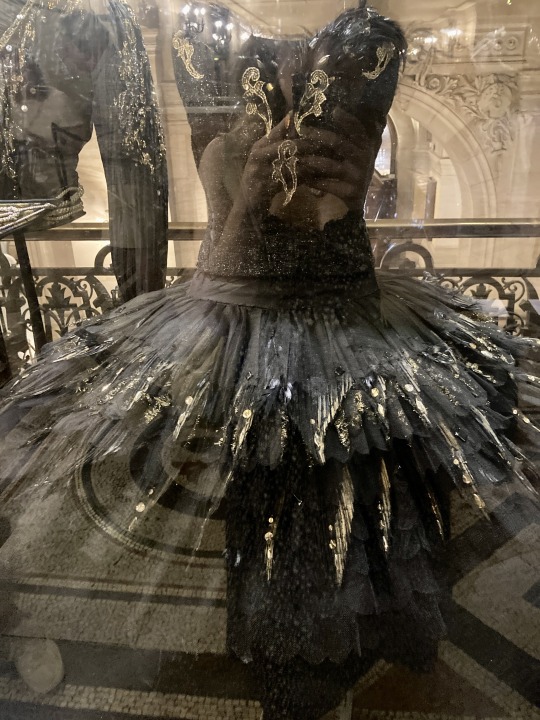
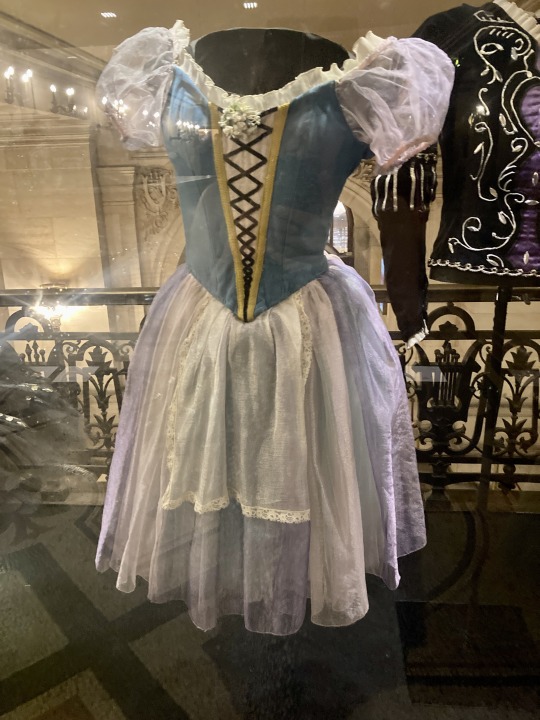

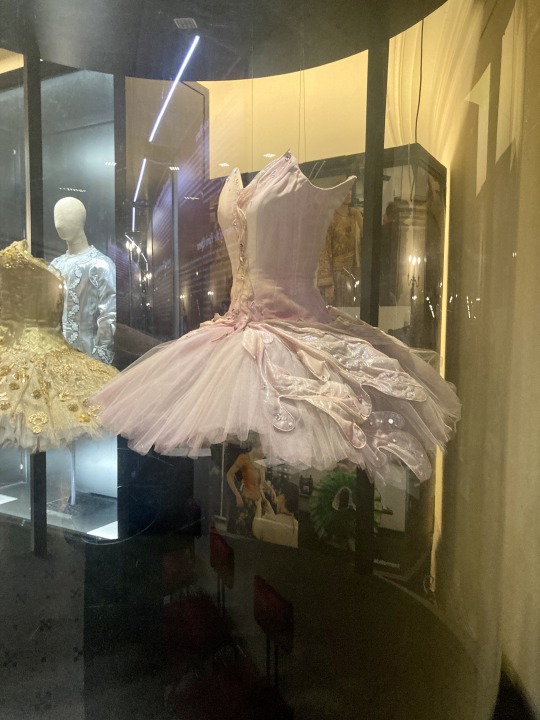
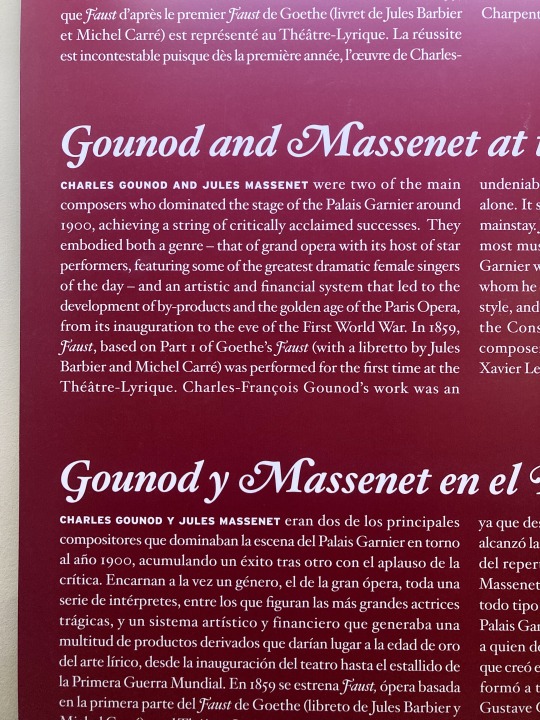
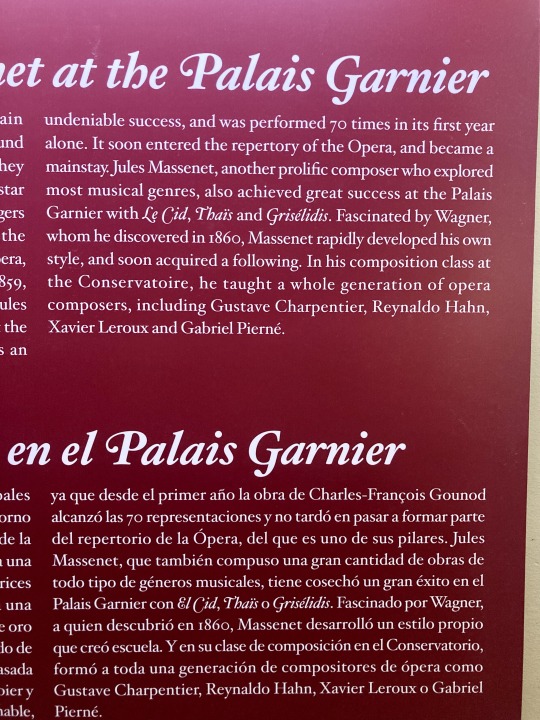
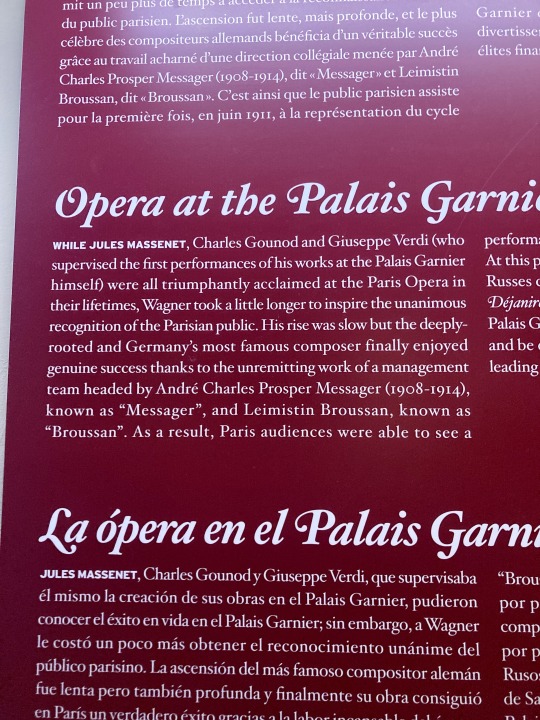

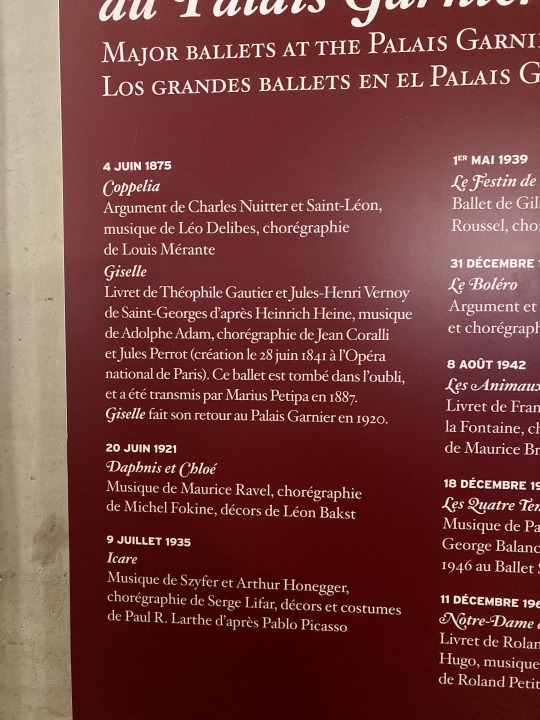

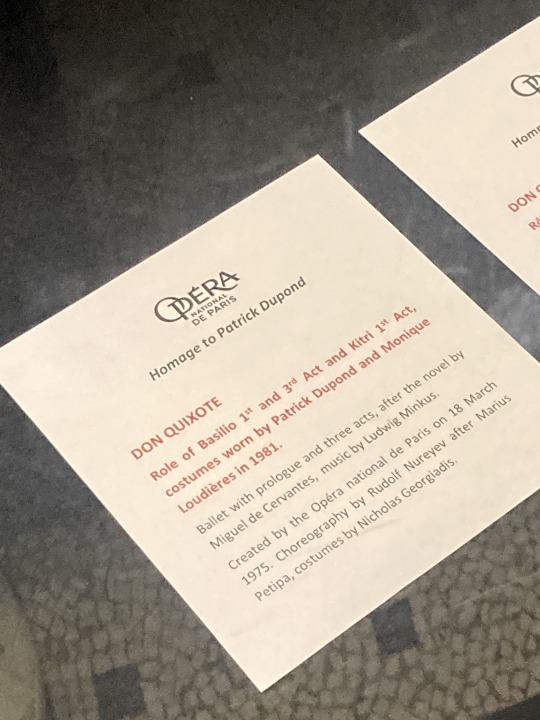
Took some photos of the exhibit up at the Opera Garnier for my own (cough cough) research purposes and thought it might be helpful for others! Thought the Don Quixote dress looked awfully familiar!
Transcript of the information under the cut:
Gounod and Massenet at the Palais Garnier
Charles Gounod and Jules Massenet were two of the main composers who dominated the stage of the Palais Garnier around 1900, achieving a string of critically acclaimed successes. They embodied both a genre - that of grand opera with its hoses of star performers, featuring some of the greatest dramatic female singers of the day - and an artistic and financial system that led to the development of by-products and the golden age of the Paris Opera from its inauguration to the eve of the First World War. In 1859, Faust, based on Part 1 of Goethe's Faust (with a libretto by Jules Barbier and Michel Carre) was performed for the first time at the Theater-Lyrique. Charles-Francois Gounod's work was an undeniable success and was performed 70 times in its first year alone. It soon entered the repertory of the Opera and became a mainstay. Jules Massenet, another prolific composer who explored most musical genres, also achieved great success at the Palais Garnier with Le Cid, Thais, and Griselidis. Fascinated by Wagner, whom he discovered in 1860, Massenet rapidly developed his own style, and soon acquired a following. In his composition class at the Conservatoire, he taught a whole generation of opera composers, including Gustave Charpentier, Reynaldo Hahn, Xavier Leroux, and Gabriel Pierne.
Opera at the Palais Garnier around 1900
While Jules Massenet, Charles Gounod, and Giuseppe Verdi (who supervised the first performances of his words at the Palais Garnier himself) were all triumphantly acclaimed at the Paris Opera in their lifetimes, Wagner took a little longer to inspire the unanimous recognition of the Parisian public. His rise was slow but the deeply-rooted and Germany's most famous composer finally enjoyed genuine success thanks to the unremitting work of a management team headed by Andre Charles Prosper Messager (1908-1914) known as "Messager", and Leimistin Broussan, known as "Broussan". As a result, Paris audiences were able to see a performance of the entire Ring cycle for the first time in June 1911. At this period, the Palais Garnier hosted Serge Diaghilev's Ballet Russes company, and Richard Strauss' Salome and Saint-Saens Dejanire both entered the repertory. During the Belle Epoque, the Palais Garnier was one of the chief places for Paris society to meet and be entertained, with an audience of subscribers made up of leading financiers, industrialists, and politicians.
Major Ballets at the Palais Garnier
4 June 1875
Coppelia - Argument de Charles Nuitter et Saint-Leon, Musique de Leo Delibes, choregraphie de Louis Merante
Giselle - Livret de Theophile Gautier et Jules-Henry Vernoy de Saint-Georges d'apres Heinrich Heine, musique de Adolphe Adam, choregraphie de Jean Coralli et Jules Perrot (creation le 28 Juin 1841 a l'opera national de Paris). Ce ballet est tombe dans l'oubli, et a ete transmis par Marius Petipa en 1887. Giselle fait son retour au Palais Garnier en 1920
20 Juin 1921
Daphnis et Chloe
musique de Maurice Ravel, choregraphie de Michel Fokine, decors de Leon Bakst
9 Jullet 1935
Icare
Musique de Szyfer et Arthur Honegger, choregraphie de Serge Lifar, decors et costumes de Paul R Larthe d'apres Pablo Picasso
18 notes
·
View notes
Text
Birthdays 8.21
Beer Birthdays
Josef Groll (1813)
Christian Diehl (1842)
David "Zambo" Zamborsky
Julian Shrago (1977)
Five Favorite Birthdays
Count Basie; jazz pianist, bandleader (1904)
Aubrey Beardsley; English artist, illustrator (1872)
Friz Freleng; animator (1906)
Joe Strummer; English rock singer, songwriter (1952)
Peter Weir; film director (1944)
Famous Birthdays
Janet Baker; English soprano (1933)
Nikolay Bogolyubov; Russian mathematician and physicist (1909)
Usain Bolt; Jamaican sprinter (1986)
Sergey Brin; Google co-founder (1973)
Bo Burnham; comedian (1990)
James Burton; guitarist (1939)
Dina Carroll; English singer-songwriter (1968)
Kim Cattrall; English-Canadian actor (1956)
Augustin-Louis Cauchy; French mathematician (1789)
Wilt Chamberlain; Philadelphia 76ers C (1936)
Jackie DeShannon; singer (1944)
Addison Farmer; bassist (1928)
Art Farmer; jazz trumpeter (1928)
Hubert Gautier; French mathematician (1660)
Charles Frédéric Gerhardt; French chemist (1816)
Carl Giammarese; singer-songwriter (1947)
Otto Goldschmidt; German composer (1829)
Eric Goles; Chilean mathematician (1951)
Nathaniel Everett Green; English painter and astronomer (1823)
Jean-Baptiste Greuze; French painter (1725)
Stephen Hillenburg; marine biologist and animator (1961)
Patrick Juvet; Swiss singer-songwriter (1950)
Angel Karaliychev; Bulgarian author (1902)
M.M. Kaye; British writer (1908)
X. J. Kennedy; poet (1929)
Ruth Manning-Sanders; Welsh-English author and poet (1886)
Giacomo F. Maraldi; French-Italian astronomer and mathematician (1665)
Patty McCormack; actor (1945)
Jim McMahon; Chicago Bears QB (1959)
Jules Michelet; French historian and philosopher (1798)
Christopher Robin Milne (1920)
Carrie-Anne Moss; Canadian actor (1967)
William Murdoch; Scottish engineer and inventor (1754)
Barry Norman; English author (1933)
William Henry Ogilvie; Scottish-Australian poet and author (1869)
Ozma, Queen of Oz; book character (1904)
Hayden Panettiere; actor (1989)
Frank Perry; film director (1930)
Basil Poledouris; Greek-American composer (1945)
Blossom Rock; actress (1895)
Kenny Rogers; country singer (1938)
Christian Schad; German painter (1894)
Lucius Shepard; author (1943)
Harry Smith; television journalist (1951)
Steve Smith; rock drummer (1954)
Ivan Stang; author (1953)
Jean Stas; Belgian chemist (1813)
Robert Stone; writer (1937)
Jeff Stryker; porn actor (1962)
Melvin Van Peebles; actor (1932)
Pete Weber; bowler (1962)
Clarence Williams III; actor (1939)
Mark Williams; New Zealand-Australian singer-songwriter (1954)
Hugh Wilson; actor and film director (1943)
Alicia Witt; actor (1975)
1 note
·
View note
Text
France: a change of head coach for Montpellier
🇫🇷| Lorenzo Tubertini no longer head coach of Montpellier Read more here 👇🏼👇🏼👇🏼
By mutual agreement, Jean-Charles Caylar, President of Ligue A side Montpellier and italin head coach Lorenzo Tubertini decided to end their collaboration at the start of this week. He will be replaced by Loic Le Marrec for the second part of the season, and he will be assisted by Gautier Bru, now at youth sector. Montpellier also said thank you to Lorenzo Tubertino for his professionalism and…

View On WordPress
0 notes
Text
UNE SEMAINE POUR SAMUEL BECKETT
Création de l’atelier metope 8 au 12 novembre 2023
SALLE EIFFEL RUE DE LA TOUR NEUVE 45000 ORLEANS
3 SPECTACLES
Ces 3 créations sont rassemblées sous le titre générique E N C O R E
- PAS MOI
avec MARTINE HEQUET
- BERCEUSE
avec CATHERINE GAUTIER
- LE DEPEUPLEUR
Avec DENIS MERCIER et CLOVIS ROTA
MERCREDI 8, VENDREDI 10, SAMEDI 11 novembre 20H30
JEUDI 9 novembre 20H30
(en réserve une possible représentation supplémentaire le dimanche 12 novembre à 17H00)
2 RENCONTRES
« Toute la vie on attend que çà vous fasse une vie »
SAMEDI 11 novembre 11H30 -13H30
S. Beckett, l’écrivain : D’un ouvrage abandonné récit lu par JEAN CHRISTOPHE COCHARD
S. Beckett, le résistant : Saint Lô, capitale des ruines texte lu par ERIC CENAT
S. Beckett, le traducteur : 4 poèmes de Paul Eluard lecture JONATHAN WAITE en langue anglaise sous-titrée titrée
S. Beckett, le critique d’art : Bram Van Velde, peintre de l’empêchement (extraits) Une critique en forme de dialogue entre l’écrivain et un critique d’art
avec HUGO ZERMATI et PHILIPPE POLET mise en voix MANOUCHKA RECOCHE
Une œuvre qui passionne :
NATHALIE LEGER, PASCALE CASANOVA, ANNE ATIK, CHARLES JULIET JEAN REMON, MARTIN ESSLIN, DIDIER ANZIEU,LUDOVIC JANVIER saluent l’homme et l’œuvre
Sélection des extraits et lecture MARTINE HEQUET, JACQUES LE NY
mirlitonnades
Micro trottoir et enfance de l’art avec les enfants du quartier des Blossières Orléans
DIMANCHE 12 NOVEMBRE 11H30 – 13H30
Des récits, des voix
- L’IMAGE
avec GERARD AUDAX
- SOUBRESAUT
avec CATHERINE GAUTIER
- AU LOIN UN OISEAU
avec JACQUES LE NY
- TEXTE POUR RIEN (n°XIII)
avec CATHERINE GAUTIER
POUR LE FINAL DE CETTE SEMAINE SAMUEL BECKETT, l’ATELIER METOPE prépare une micro ballade en compagnie de monsieur et madame ROONEY, les principaux personnages de TOUS CEUX QUI TOMBENT (pièce radiophonique écrite par SAMUEL BECKETT, à la demande de la BBC). Diffusion des enregistrements salle EIFFEL, le dimanche 12 novembre à partir de 13H00)
LES ŒUVRES DE SAMUEL BECKETT sont publiées aux EDITIONS DE MINUIT
POUR LA REALISATION DE CETTE SEMAINE AVEC SAMUEL BECKETT L’ATELIER METOPE REMERCIE CELLES ET CEUX QUI, ACTRICES, ACTEURS, VIDEASTE, INGENIEUR DU SON , MUSICIENS, SCULPTEURS ,PEINTRES, CERAMISTES, Y CONTRIBUENT ARTISTIQUEMENT
Dont
Guilaine Agnez, Gérard Audax, Daniel Beghdad, Eric Cénat, Jean Christophe Cochard, Catherine Gautier, Béatrice Grebot, Franck Jublot, Denis Mercier, Evelyne Poinloup ,Manouchka Récoché, Alexis Renou, Adèle et Albane Rousset, Jonathan Waite, Hugo Zermati
CONCEPTION ET COORDINATION GENERALE JACQUES LE NY
1 note
·
View note
Text
David Bowie : exposition exceptionnelle à St-Étienne

Du 4 au 13 octobre prochains, l’École de design et des Beaux Arts de la ville de Saint-Étienne accueille la nouvelle itération d’une exposition sur David Bowie devenue incontournable. Cette année, la “Bowie Odyssée” embarque Jean-Charles Gautier et Yves Gardes, deux inconditionnels aux collections plus qu’impressionnantes. Rencontres
“C’est fou – tout le monde connaît David Bowie.” Une phrase prononcée par Éric Tandy, résonnant au propre comme au figuré : assis au milieu d’un des immenses halls de l’École de design et des Beaux Arts de St-Étienne, le commissaire de l’exposition “Bowie Odyssée” répond calmement et avec passion à nos quelques questions. Pourtant, il a un sacré poids sur les épaules : celui de faire vivre la plus grosse exposition consacrée à David Bowie, pour la deuxième année consécutive – rien que ça. En effet, dans le cadre du festival Rhino Jazz(s) – rendez-vous immanquable pour tous les amateurs du genre qui fête ses quarante ans en 2018 – que Jean-Paul Chazalon (président) et son fils Ludovic (directeur artistique de l’événement) organisent ensemble, David Bowie sera mis à l’honneur du 4 au 13 octobre prochains pour un événement en trois parties. “Hors-normes, énorme,” à l’image du “personnage” selon Jean-Paul Chazalon, dont le “rapport très étroit avec les musiques de jazz” (Ludovic Chazalon) sera entretenu jusqu’à la fin sur l’album Blackstar, un disque enregistré avec la crème des jazzmen new-yorkais, dont un certain Donny McCaslin.

Polymorphe par essence
Les trois étapes de l’odyssée Bowie proposée par l’expo : un concert acoustique (avec, entre autres, Sandra Nkaké), un autre symphonique (avec notamment Nosfel), organisé à l’Opéra de St-Étienne, et une monstrueuse exposition, dont le contenu est en partie assuré par deux collectionneurs, Jean-Charles Gautier et Yves Gardes. Au programme : plus de 600 pièces (une première), dont un acte de naissance original (!), et autant de témoins de la force de frappe musicale et artistique d’un personnage à part dans le paysage pop moderne.
Photographies originales, press kits, tirages, disques rarissimes, partitions (celle “du premier morceau qu’il ait jamais écrit !” s’exclame Éric Tandy)... une collection qui, sans être éclectique (est-ce seulement possible ?), devrait laisser sans voix fans et curieux. Mais d’où peut provenir un tel appétit autour des souvenirs d’un artiste ? Un culte, une dévotion ? “Je n’y ai jamais vraiment réfléchi” répond Yves Gardes. Plutôt “une grande passion” qui “agrémente la vie,” finit-il par répondre. “Ce qui est intéressant, c’est la façon dont son univers a marqué des personnes à des niveaux et des façons totalement différentes” nous confirmait un peu plus tôt Éric Tandy. “Chacun a une petite histoire de sa vie liée à Bowie.” Car si Bowie a pu déranger, particulièrement en France – “Ça a tellement gêné qu'[il] n’ait pas d’étiquette” rappelle, amusé, Jean-Charles Gautier – difficile de ne pas lui accorder le crédit de sa richesse, de ses expérimentations tentaculaires, de ses changements permanents. En cinquante ans de carrière (ce dont peu d’artistes peuvent se targuer, “sauf Dylan”), “il a fait exploser les formats pop,” a “réécrit son histoire” d’après Éric Tandy, qui rappelle son influence majeure dans les années 80 notamment. “Un artiste au grand sens du terme” pour le collectionneur Jean-Charles Gautier, qui déplore la dégradation du terme au profit d’une “starification” qui peut prêter à sourire en comparaison aux boulimies artistiques et stylistiques du Thin White Duke.

Un projet titanesque
Un déchaînement de passion indispensable lorsqu’il s’agit de célébrer la carrière d’un artiste aussi marquant. Et pourtant : le projet, dont la première saison fut lancée en 2017, a failli ne jamais voir le jour suite à la disparition brutale de Bowie, le 10 janvier 2016 à New York, quelques jours seulement après la sortie de son album-testament Blackstar. Mais ce qui ressemblait à un coup de massue n’a fait que renforcer les intentions et les ambitions de l’équipe, se rappelle Jean-Paul Chazalon. Des ambitions portées cette année par le double concert qui accompagne l’exposition, “une nouvelle réflexion autour de l’opus musical de Bowie” nous explique Ludovic Chazalon, qui cherche tout particulièrement à “proposer une réécriture autour des musiques de Bowie.”

“The stars are out tonight” à St-Étienne
Culte, incontournable, David Bowie s’immisce jusque dans un festival de jazz à St-Étienne – une nouvelle preuve de son omnipotence musicale, qui confine presque à l’insolence. “Ce mec-là est beaucoup plus immense que ce que j’avais pu imaginer à un moment donné” nous confie Jean-Paul Chazalon, immense passionné de jazz mais encore novice au sujet de l’œuvre de Bowie, sur laquelle il en apprend encore aujourd’hui. “Il s’ouvre à tout” rappelle Yves Gardes, pour qui “chaque état d’esprit qu’on peut avoir dans sa vie, (…) on a un album.” Un constat qui renvoie les deux collectionneurs aux origines de leur passion commune, “avec Diamond Dogs en 74″ se rappelle Jean-Charles Gautier, qui s’est rapidement demandé “comment quelqu’un pouvait aborder deux thèmes aussi différents (en rapport avec l’album précédent, ndlr) ?” “Beaucoup plus tard” pour Yves Gardes, qui est “remonté dans le temps” en le découvrant dans les années 80 : “blond, bronzé,” avec une “musique pop hyper abordable, succès mondial...”
Un artiste complet qu’on ne présente plus mais qui suscite une curiosité intarissable, pour des raisons tout aussi nombreuses : ses expérimentations, son héritage (”un passeur” pour Yves Gardes, qui a autant pris que donné à des artistes comme Sonic Youth, les Pixies, Placebo, Iggy Pop, Lou Reed…), mais aussi sa discrétion. Comme le rappelle Éric Tandy dans une saillie : “Tout le monde s’en fout de sa vie intime (…) il a tout dit de suite.” Sûrement une façon pour lui de se consacrer exclusivement à son art, sans jamais l’occulter avec des histoires nuisibles. Et une raison supplémentaire d’en apprendre encore aujourd’hui sur un véritable caméléon de la pop culture, à qui la ville de St-Étienne rend ici un hommage aussi vibrant et foisonnant que ne le fut sa carrière.
#david bowie#thin white duke#expo#exposition#odyssée#st-etienne#eric tandy#jean-charles gautier#yves gardes
1 note
·
View note
Text
Dis donc, Ferré
Françoise Travelet, “Dis donc, Ferré..” (1976), p104..: ...Un jour où nous déjeunons ensemble, tout à coup Léo me dit: “En ce moment, j'ai des problèmes avec Baudelaire…Avec Baudelaire, je suis passionné et passionnément critique. Quand j'ai lu le livre de Sartre (sur Baudelaire), j'ai été violemment contre Sartre, puis j'y ai repensé et beaucoup d'arguments m'ont impressionné. A cela près que Sartre est volontairement loin de la poésie. Il n'aime pas Baudelaire, il aime Genet, ce qui d'ailleurs lui fait écrire des lignes extraordinaires pour lui, pas pour Genet. Un livre de morale fantastique qui est le plus beau livre de Sartre ("Saint-Genet, comédien et martyr”)… “ Alors Léo, quels problèmes avec Baudelaire? "Ce n'est pas moi qui ai des problèmes avec Baudelaire, c'est Sartre !” Sartre ? Non ! Lui, oui, parce qu'il a trop aimé Baudelaire et que le livre de Sartre lui a gâché cette amitié. “ ‘ Au poète impeccable ! ’ C'est vraiment lamentable, dégueulasse…Après avoir écrit "Les Fleurs du Mal”, on ne le dédie à personne, et surtout pas à Théophile Gautier !...“…
#Léo Ferré#Françoise Travelet#Dis donc Ferré#Charles Baudelaire#Jean-Paul Sartre#Jean Genet#Saint-Genet comédien et martyr#Théophile Gautier
3 notes
·
View notes
Note
Bonjour maman! I hope you are doing well. I am an avid reader and lover of poetry and I have wanted to read French poetry for a long, long time. Could you please suggest some poems/collections (B1 - B2) for me?
Hello dear,
It would be hard to make a universal list for this because B1/B2 can look many different ways, the best advice I have is to check out famous authors and see at first glance if their stuff looks too hard for you or not. Here are the basics and an example:
B1/B2 with a good dictionary:
Correspondance by Charles Baudelaire
Dans les bois by Paul Verlaine
La demoiselle by Théophile Gautier
Les malheureux by Louise Ackermann ♀
Crépuscule by Guillaume Apollinaire
Les yeux d'Elsa by Louis Aragon (which I would claim to be the most beautiful love poem in the world)
L'hirondelle by Sophie d'Arbouville ♀
Chanson à boire by Nicolas Boileau
La nuit de printemps by Théodore de Banville
L'ennui de Léonore by Victoire Babois ♀
Les feuilles mortes by Jacques Prévert
Regrets d'amour by Pierre Corneille
Des vivants et des morts - Andrée Chedid ♀
Le désir by Anatole France
À Aurore by George Sand ♀
Par un mauvais temps by Alfred de Musset
Melancholia by Victor Hugo
Le bonheur est mélancolique by Cécile Sauvage ♀
C1/C2 but give it a try anyway:
Première soirée by Arthur Rimbaud
Luth compagnon de ma calamité by Louise Labé ♀
La sagesse by Alphonse de Lamartine
Prière de Socrate by Gérard de Nerval
Le temps de vivre by Anna de Noailles ♀
Le songe by Charles-Augustin Sainte-Beuve
Ce que dit l'homme de peine by Paul Éluard
Élégie du printemps by Pierre de Ronsard
La grande douleur que je porte by Christine de Pisan ♀
Poème à Uranie - Voltaire
La prison by Alfred de Vigny
L'amour et la folie by Jean de la Fontaine
Ô qu'une sagesse profonde by François de Malherbe
L'âme errante by Marceline Desbordes-Valmore ♀
Les fleurs by Stéphane Mallarmé
Le lundi à Vêpres by Jean Racine
C'était novembre by Vénus Khoury-Ghata (1937-) ♀
Holy shit:
Escargots by Francis Ponge (XX, surrealism)
Nous ne sommes fâchés by Joachim Du Bellay (XVI)
Ballade des dames du temps jadis by François Villon (XV)
Lai du Frêne by Marie de France ♀ (XII)
Je brûle avec mon coeur by Théodore Aggripa d'Aubigné (XVI)
Plus:
Entire anthology about female poetry
Hope this helps! x

758 notes
·
View notes
Text

The arctic explorer Elisha Kent Kane, best known for his participation in the Grinnell expeditions in search of Sir John Franklin, shown during his time in the Mexican-American War of 1846-1848.
From a fashion standpoint, his nipped waist suggests a corset (perhaps like this extant men's corset of 1842), but his hair is the focus on Eighteen-Forties Friday. Kane has a lovely example of the longer men's hairstyles of the 1840s: "A side parting with the oiled hair looking sleek and smooth round the face, falling to the neck where it curled under, was a typical coiffure of the decade." (Handbook of English Costume in the 19th Century, C. Willett and Phillis Cunnington)
Another name for this look was "La Jeune France", presumably inspired by the French Romantics like the notoriously long-haired Théophile Gautier (who also wrote a novel called Les Jeunes-France).

Gautier sculpted in 1845 by Pierre-Jean David d'Angers (Paris Musées).
Using Google Books, I searched for period references to the style:
"The prisoner... happened to have long black hair, which he wore somewhat 'en jeune France' upon his neck and shoulders" — Charles Lever, Nuts and Nutcrackers (1845) (link)
"The barber's apprentice, the yearling student, and the bellicose pygmies beyond the Channel, arrange their locks à-la–jeune-France." — Written Caricatures; a sketch of peripatetic philosophy; from hints in the Paris Charivari: by Captain Pepper (1841) (link), with illustrations by John Leech.
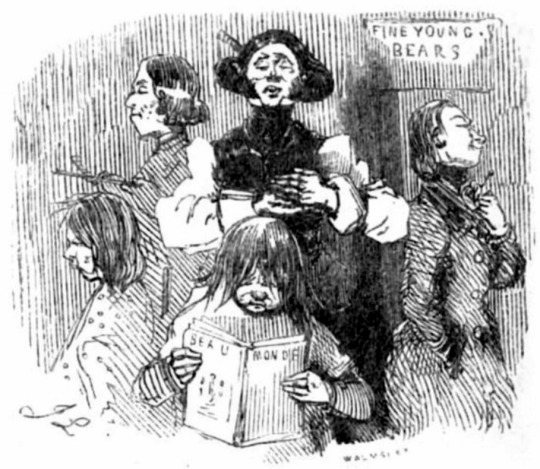
"Young ladies having a taste for sentimental-looking men, who wear their hair à la jeune France" — Punch magazine, 1841 (link)
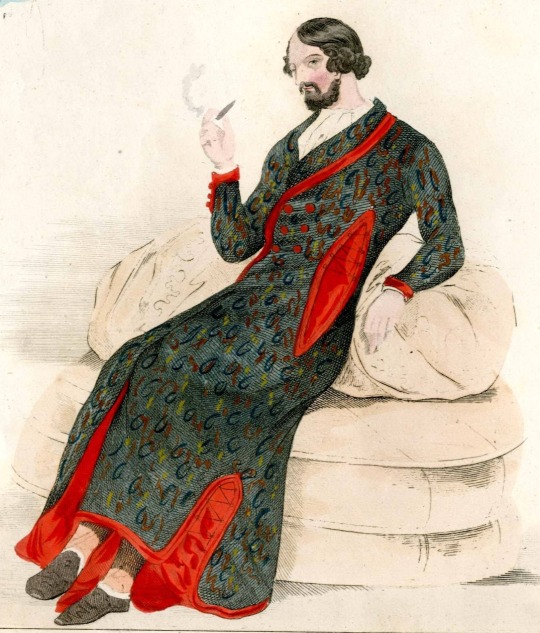
Mister Leisure Wear 1841: cigar, long hair with a side part, loud pattern on the dressing gown (Met fashion plate detail).
#1840s#Eighteen-Forties Friday#men's fashion#hairstyles#fashion history#jeune france#elisha kent kane#theophile gautier#hair#victorian#fashion#john leech#historical men's fashion#romantic era#early victorian era#historical hair curling#historical hairstyles
68 notes
·
View notes
Text
Squash’s Book Roundup of 2022
This year I read 68 books. My original goal was to match what I read in 2019, which was 60, but I surpassed it with quite a bit of time to spare.
Books Read In 2022:
-The Man Who Would Be King and other stories by Rudyard Kipling -Futz by Rochelle Owens -The Threepenny Opera by Bertolt Brecht -Funeral Rites by Jean Genet -The Grip of It by Jac Jemc -Jules et Jim by Henri-Pierre Roche -Hashish, Wine, Opium by Charles Baudelaire and Theophile Gautier -The Blacks: a clown show by Jean Genet -One, No One, One Hundred Thousand by Luigi Pirandello -Cain’s Book by Alexander Trocchi -The Man with the Golden Arm by Nelson Algren -Three-Line Novels (Illustrated) by Felix Feneon, Illustrated by Joanna Neborsky -Black Box Thrillers: Four Novels (They Shoot Horses Don’t They, Kiss Tomorrow Goodbye, No Pockets in a Shroud, I Should Have Stayed Home) by Horace McCoy -The Dictionary of Accepted Ideas by Gustave Flaubert -The Chairs by Eugene Ionesco -Illusions by Richard Bach -Mole People by Jennifer Toth -The Rainbow Stories by William T Vollmann -Tell Me Everything by Erika Krouse -Equus by Peter Shaffer (reread) -Ghosty Men by Franz Lidz -A Happy Death by Albert Camus -Six Miles to Roadside Business by Michael Doane -Envy by Yury Olesha -The Day of the Locust by Nathaniel West -Thus Spoke Zarathustra by Friedrich Nietzsche -The Riddle of the Labyrinth: The Quest to Crack an Ancient Code by Margalit Fox -The Cat Inside by William S Burroughs -Under The Volcano by Malcolm Lowry -Camino Real by Tennessee Williams (reread) -The Private Memoirs and Confessions of a Justified Sinner by James Hogg -The Quick & The Dead by Joy Williams -Comemadre by Roque Larraquy -The Zoo Story by Edward Albee -The Bridge by Hart Crane -A Likely Lad by Peter Doherty -The Stranger in the Woods: The Extraordinary Story of the Last True Hermit by Michael Finkel -The Law In Shambles by Thomas Geoghegan -The Anti-Christ by Friedrich Nietzche -The Maids and Deathwatch by Jean Genet -Intimate Journals by Charles Baudelaire -The Screens by Jean Genet -Inferno by Dante Alighieri (reread) -The Quarry by Friedrich Durrenmatt -A Season In Hell by Arthur Rimbaud (reread) -Destruction Was My Beatrice: Dada and the Unmaking of the Twentieth Century by Jed Rasula -Pere Ubu by Alfred Jarry -Bitter Fame: A Life of Sylvia Plath by Anne Stevenson -Loot by Joe Orton -Julia And The Bazooka and other stories by Anna Kavan -The Haunting of Lin-Manuel Miranda by Ishmael Reed -If You Were There: Missing People and the Marks They Leave Behind by Francisco Garcia -Detransition, Baby by Torrey Peters -Indelicacy by Amina Cain -Withdrawn Traces by Sara Hawys Roberts (an unfortunate but necessary reread) -Sarah by JT LeRoy (reread) -How Lucky by Will Leitch -Gyo by Junji Ito (reread) -Joe Gould’s Teeth by Jill Lepore -Saint Glinglin by Raymond Queneau -Bakkai by Anne Carson -Reflections in a Golden Eye by Carson McCullers -McGlue by Ottessa Moshfegh -Moby Dick by Herman Melville -The Hour of the Star by Clarice Lispector -In the Forests of the Night by Amelia Atwater-Rhodes (reread from childhood) -Chicago: City on the Make by Nelson Algren -The Medium is the Massage by Malcolm McLuhan
~Superlatives And Thoughts~
Fiction books read: 48 Non-fiction books read: 20
Favorite book: This is so hard! I almost want to three-way tie it between Under The Volcano, The Quick & The Dead, and The Man With The Golden Arm, but I’m not going to. I think my favorite is Under The Volcano by Malcolm Lowry. It’s an absolutely beautiful book with such intense descriptions. The way that it illustrates the vastly different emotional and mental states of its three main characters reminded me of another favorite, Sometimes A Great Notion by Ken Kesey. Lowry is amazing at leaving narrative breadcrumbs, letting the reader find their way through the emotional tangle he’s recording. The way he writes the erratic, confused, crumbling inner monologue of the main character as he grows more and more ill was my favorite part.
Least favorite book: I’d say Withdrawn Traces, but it’s a reread, so I think I’ll have to go with Detransition, Baby by Torrey Peters. I dedicated a whole long post to it already, so I’ll just say that the concept of the book is great. I loved the whole idea of it. But the execution was awful. It’s like the exact opposite of Under The Volcano. The characters didn’t feel like real people, which would have been fine if the book was one written in that kind of surreal or artistic style where characters aren’t expected to speak like everyday people. But the narrative style as well as much of the dialogue was attempting realism, so the lack of realistic humanity of the characters was a big problem. The book didn’t ever give the reader the benefit of the doubt regarding their ability to infer or empathize or figure things out for themselves. Every character’s emotion and reaction was fully explained as it happened, rather than leaving the reader some breathing space to watch characters act or talk and slowly understand what’s going on between them. Points for unique idea and queer literature about actual adults, but massive deduction for the poor execution.
Unexpected/surprising book: The Riddle of the Labyrinth: The Quest to Crack an Ancient Code by Margalit Fox. This is the first book about archaeology I’ve ever read. I picked it up as I was shelving at work, read the inner flap to make sure it was going to the right spot, and then ended up reading the whole thing. It was a fascinating look at the decades-long attempt to crack the ancient Linear B script, the challenges faced by people who tried and the various theories about its origin and what kind of a language/script it was. The book was really engaging, the author was clearly very passionate and emotional about her subjects and it made the whole thing both fascinating and fun to read. And I learned a bunch of new things about history and linguistics and archaeology!
Most fun book: How Lucky by Will Leitch. It was literally just a Fun Book. The main character is a quadriplegic man who witnesses what he thinks is a kidnapping. Because he a wheelchair user and also can’t talk except through typing with one hand, his attempts to figure out and relay to police what he’s seen are hindered, even with the help of his aid and his best friend. But he’s determined to find out what happened and save the victim of the kidnapping. It’s just a fun book, an adventure, the narrative voice is energetic and good-natured and it doesn’t go deeply into symbolism or philosophy or anything.
Book that taught me the most: Destruction Was My Beatrice by Jed Rasula. This book probably isn’t for everyone, but I love Dadaism, so this book was absolutely for me. I had a basic knowledge of the Dadaist art movement before, but I learned so much, and gained a few new favorite artists as well as a lot of general knowledge about the Dada movement and its offshoots and members and context and all sorts of cool stuff.
Most interesting/thought provoking book: Moby Dick by Herman Melville. I annotated my copy like crazy. I never had to read it in school, but I had a blast finally reading it now. There’s just so much going on in it, symbolically and narratively. I think I almost consider it the first Modernist novel, because it felt more Modernist than Romantic to me. I had to do so much googling while reading it because there are so many obscure biblical references that are clear symbolism, and my bible knowledge is severely lacking. This book gave me a lot of thoughts about narrative and the construction of the story, the mechanic of a narrator that’s not supposed to be omniscient but still kind of is, and so many other things. I really love Moby Dick, and I kind of already want to reread it.
Other thoughts/Books I want to mention but don’t have superlatives for: Funeral Rites was the best book by Jean Genet, which I was not expecting compared to how much I loved his other works. It would be hard for me to describe exactly why I liked this one so much to people who don’t know his style and his weird literary tics, because it really is a compounding of all those weird passions and ideals and personal symbols he had, but I really loved it. Reading The Grip Of It by Jac Jemc taught me that House Of Leaves has ruined me for any other horror novel that is specifically environmental. It wasn’t a bad book, just nothing can surpass House Of Leaves for horror novels about buildings. The Man With The Golden Arm by Nelson Algren was absolutely beautiful. I went in expecting a Maltese Falcon-type noir and instead I got a novel that was basically poetry about characters who were flawed and fucked up and sad but totally lovable. Plus it takes place only a few blocks from my workplace! The Rainbow Stories by William T Vollmann was amazing and I totally love his style. I think out of all the stories in that book my favorite was probably The Blue Yonder, the piece about the murderer with a sort of split personality. Scintillant Orange with all its biblical references and weird modernization of bible stories was a blast too. The Quick & The Dead by Joy Williams was amazing and one of my favorites this year. It’s sort of surreal, a deliberately weird novel about three weird girls without mothers. I loved the way Williams plays with her characters like a cat with a mouse, introducing them just to mess with them and then tossing them away -- but always with some sort of odd symbolic intent. All the adult characters talk and act more like teens and all the teenage characters talk and act like adults. It’s a really interesting exploration of the ways to process grief and change and growing up, all with the weirdest characters. Joe Gould’s Teeth was an amazing book, totally fascinating. One of our regulars at work suggested it to me, and he was totally right in saying it was a really cool book. It’s a biography of Joe Gould, a New York author who was acquaintances with EE Cummings and Ezra Pound, among others, who said he was writing an “oral history of our time.” Lepore investigates his life, the (non)existence of said oral history, and Gould’s obsession with a Harlem artist that affected his views of race, culture, and what he said he wanted to write. McGlue by Ottessa Moshfegh was so good, although I only read it because 3 out of my other 5 coworkers had read it and they convinced me to. I had read a bunch of negative reviews of Moshfegh’s other book, so I went in a bit skeptical, but I ended up really enjoying McGlue. The whole time I read it, it did feel a bit like I was reading Les Miserables fanfiction, partly from the literary style and partly just from the traits of the main character. But I did really enjoy it, and the ending was really lovely. In terms of literature that’s extremely unique in style, The Hour Of The Star by Clarice Lispector is probably top of the list this year. Her writing is amazing and so bizarre. It’s almost childlike but also so observant and philosophical, and the intellectual and metaphorical leaps she makes are so fascinating. I read her short piece The Egg And The Chicken a few months ago at the urging of my coworker, and thought it was so cool, and this little novel continues in that same vein of bizarre, charming, half-philosophical and half-mundane (but also totally not mundane at all) musings.
I'm still in the middle of reading The Commitments by Roddy Doyle (my lunch break book) and The Hero With A Thousand Faces by Joseph Campbell, but I'm not going to finish either by the end of the year, so I'm leaving them off the official list.
#squash rambles#reading year in review#book list year in review#book list#reading list#book roundup#reading roundup
7 notes
·
View notes
Text
Introduction/Who am I?
Okay, so since I’m back on here again in the ongoing exodus, I thought I’d better do an introductory post for anyone who wants to follow as well as refresh old friends and followers. Open to new friendships so feel free to send me asks, reply, or whatever if you want to talk.
Francesca (Fran, Frankie for short)
Englishwoman
Lesbian, f4f
Cat person (see previous bullet)
I enjoy writing although I’m aware I’ll probably never be published so it’s mostly just something I do for my own personal catharsis and expression.
Night owl
Haute couture enjoyer
Learning French (c. B1, B2 reading level), want to learn European Portuguese, Spanish, Latin, Dutch, interested in language acquisition more broadly
I’ve always been a voracious reader so some favourite authors, poets and essayists: Sappho, Gustave Flaubert, Charles Baudelaire, Arthur Rimbaud, Théophile Gautier, Gérard de Nerval, Marcel Proust, Alain-Fournier, Jorge Luis Borges, Camilo Castelo Branco, Yukio Mishima, Jean Genet, Anaïs Nin, Novalis, Simone Weil, Jacques Lacan, Plato, James Joyce, Emily Brontë, Jane Austen, Oscar Wilde, George Orwell, Vladimir Nabokov, John Donne, F. Scott Fitzgerald, Emily Dickinson, Fyodor Dostoevsky. My favourite novel (and maybe favourite work of art full stop) is Madame Bovary.
Cinema is my other great passion and one I’ve spent the last few years particularly delving into - some favourite directors/auteurs: Carl Dreyer, Michael Powell (& Emeric Pressburger), Manoel de Oliveira, Alfred Hitchcock, Howard Hawks, Yasujiro Ozu, Francis Ford Coppola, Brian de Palma, Raoul Ruiz, Douglas Sirk, Josef von Sternberg, Ernst Lubitsch, Erich von Stroheim, F.W. Murnau, Fritz Lang, Claude Chabrol, Éric Rohmer, Jean Renoir, Max Ophüls, Eugène Green, Rainer Werner Fassbinder, Luis Buñuel, Pedro Costa, Luchino Visconti, Val Lewton, Dario Argento, Ingmar Bergman, Nagisa Oshima, Wojciech Has. My favourite film is A Matter of Life and Death (1946).
My favourite actresses: Isabelle Huppert (in love with her), Catherine Deneuve, Sophia Loren, Joan Crawford, Barbara Stanwyck, Susan Hayward, Marlene Dietrich, Isabelle Adjani, Sissy Spacek, Vivien Leigh, Penélope Cruz, Fanny Ardant, Monica Bellucci, Emmanuelle Béart, Sandrine Bonnaire
Favourite music: Erik Satie, Claude Debussy, Serge Gainsbourg, Sergio Mendes, Miles Davis, John Coltrane, Charles Mingus, Herbie Hancock, Ella Fitzgerald, Billie Holiday, Dusty Springfield, Nina Simone, Carpenters, Stevie Wonder, Prince, Kate Bush, Cocteau Twins, Björk, Talking Heads, The Cure, Boards of Canada, Joy Division, New Order, The Velvet Underground, Massive Attack, Portishead, Manic Street Preachers
Also enjoy art/painting, aesthetics, fashion, memes, food and (maybe too much) drink. Lots more that I can’t think of at the moment so maybe a sequel in the future when I feel like being inward-looking again?
#introduction#reference#intro post#language learning#cinema#literature#art#francescaderochefort#about me#language acquisition
9 notes
·
View notes
Text

Natalia Matsak, “Giselle” (rehearsal), libretto by Théophile Gautier, Jules Henri Vernoy de Saint Georges, Jean Coralli, choreography by Charles Perrault, Jean Coralli, Marius Petipa, music by Adolphe Adam, National Opera of Ukraine
Photographer Alexandra Zlunitsyna
14 notes
·
View notes
Text
Birthdays 8.21
Beer Birthdays
Josef Groll (1813)
Christian Diehl (1842)
David "Zambo" Zamborsky
Julian Shrago (1977)
Five Favorite Birthdays
Count Basie; jazz pianist, bandleader (1904)
Aubrey Beardsley; English artist, illustrator (1872)
Friz Freleng; animator (1906)
Joe Strummer; English rock singer, songwriter (1952)
Peter Weir; film director (1944)
Famous Birthdays
Janet Baker; English soprano (1933)
Nikolay Bogolyubov; Russian mathematician and physicist (1909)
Usain Bolt; Jamaican sprinter (1986)
Sergey Brin; Google co-founder (1973)
Bo Burnham; comedian (1990)
James Burton; guitarist (1939)
Dina Carroll; English singer-songwriter (1968)
Kim Cattrall; English-Canadian actor (1956)
Augustin-Louis Cauchy; French mathematician (1789)
Wilt Chamberlain; Philadelphia 76ers C (1936)
Jackie DeShannon; singer (1944)
Addison Farmer; bassist (1928)
Art Farmer; jazz trumpeter (1928)
Hubert Gautier; French mathematician (1660)
Charles Frédéric Gerhardt; French chemist (1816)
Carl Giammarese; singer-songwriter (1947)
Otto Goldschmidt; German composer (1829)
Eric Goles; Chilean mathematician (1951)
Nathaniel Everett Green; English painter and astronomer (1823)
Jean-Baptiste Greuze; French painter (1725)
Stephen Hillenburg; marine biologist and animator (1961)
Patrick Juvet; Swiss singer-songwriter (1950)
Angel Karaliychev; Bulgarian author (1902)
M.M. Kaye; British writer (1908)
X. J. Kennedy; poet (1929)
Ruth Manning-Sanders; Welsh-English author and poet (1886)
Giacomo F. Maraldi; French-Italian astronomer and mathematician (1665)
Patty McCormack; actor (1945)
Jim McMahon; Chicago Bears QB (1959)
Jules Michelet; French historian and philosopher (1798)
Christopher Robin Milne (1920)
Carrie-Anne Moss; Canadian actor (1967)
William Murdoch; Scottish engineer and inventor (1754)
Barry Norman; English author (1933)
William Henry Ogilvie; Scottish-Australian poet and author (1869)
Ozma, Queen of Oz; book character (1904)
Hayden Panettiere; actor (1989)
Frank Perry; film director (1930)
Basil Poledouris; Greek-American composer (1945)
Blossom Rock; actress (1895)
Kenny Rogers; country singer (1938)
Christian Schad; German painter (1894)
Lucius Shepard; author (1943)
Harry Smith; television journalist (1951)
Steve Smith; rock drummer (1954)
Ivan Stang; author (1953)
Jean Stas; Belgian chemist (1813)
Robert Stone; writer (1937)
Jeff Stryker; porn actor (1962)
Melvin Van Peebles; actor (1932)
Pete Weber; bowler (1962)
Clarence Williams III; actor (1939)
Mark Williams; New Zealand-Australian singer-songwriter (1954)
Hugh Wilson; actor and film director (1943)
Alicia Witt; actor (1975)
1 note
·
View note
Text
youtube
[Belladova-Opéra Garnier's ballerina(Giselle) and soprano(Richard Coeur-de-Lion)(Kopit's Phantom(90, 91)]
0:01 15th Century Chartres(French) hymn tune ( -> Saw You Never, in the Twilight(Cecil Frances Alexander)(1853)) - Michèle Lagrange
0:13 Giselle(, ou les Wilis (=Giselle, or The Wilis') 2:35 )(1841)(Music - Adolphe Charles Adam) (* Teri Polo who played Belladova(and Christine) had learned ballet for many years.)
1:25 Giselle(, ou les Wilis)(1841)
(Choreographer - Jean Coralli & Jules Perrot, Music - Adolphe Charles Adam, Libretto - Jules-Henri Vernoy de Saint-Georges & Théophile Gautier)
-----------------------------------------------
- Yvette Chauviré(Giselle) & Cyril Atanasoff(Albrecht)
(* Yvette Chauviré was a French 'Prima ballerina assoluta'(She is the only French dancer to hold the title) and actress. She is often described as France's greatest ballerina, and was the coach of prima ballerinas Sylvie Guillem and Marie-Claude Pietragalla. The role of Giselle was a particular passion for Chauviré, and she considered it her signature piece. Of course, she is considered one of the gratest Giselles in history.)
1:56 Carla Fracci(Giselle) & Erik Bruhn(Albrecht)
(* Carla Fracci was an Italian ballet dancer, actress and ballet director. Considered one of the greatest ballerinas of the 20th century, she was a leading dancer of La Scala Theatre Ballet in Milan, then worked freelance with international companies including the Royal Ballet, London, Stuttgart Ballet, Royal Swedish Ballet and American Ballet Theatre. Fracci is known for her interpretation of leading characters in several Romantic ballets, such as La Sylphide, Giselle, Swan Lake, and Romeo and Juliet. Fracci is considered one of the gratest Giselles in history too.)
--------------------------------------------------
5:34 & 6:20 Je crains de lui parler la nuit(= I'm afraid to talk to him at night)(André Grétry's Richard Coeur-de-Lion(=Richard the Lionheart)(1784)) - Michèle Lagrange
(* André Grétry(you might see his face at Belgium 1000 Francs) was a composer from the Prince-Bishopric of Liège (present-day Belgium), who worked from 1767 onwards in France and took French nationality. He is most famous for his opéras comiques.)
7:42 Je crains de lui parler la nuit
(André Grétry's Richard Richard Coeur-de-Lion(1784)) - Mady Mesplé
11:03 / 13:45 Пётр Ильи́ч Чайко́вский(Pyotr Ilyich Tchaikovsky)'s Пиковая дама(= Pique Dame = The Queen of Spades)(1890). Tchaikovsky(Чайко́вский)used Grétry's 'Je crains de lui parler la nuit'.(In Grétry's Opera, Soprano sings this, but in Tchaikovsky(Чайко́вский)'s opera, Mezzo Soprano sings this song.)
13:45 - Soňa Červená
15:31 - Sofia Preobragenskaya(acted by Yelena Polevitskaya)
(* Virginia Zeani - One of the greatest female opera singers of the 20th century - sang this song too(as a Countess in The Queen of the Spades(In Italian)). You can find that audio recording at youtube.)
17:29 Musical version (Kopit(Book) & Yeston(Music and lyrics)'s musical "Phantom"(1991))
P.S. You can see two famous actors - Burt Lancaster(7:39) and Олег Александрович Стриженов(Oleg Aleksandrovich Strizhenov)(14:54) in this video. From this film(Пиковая дама(1960)), Oleg Strizhenov received the Aleksandr Pushkin's Big Gold Medal and the prize of the Russian Musical Fund of Irina Arkhipova "for the brilliant realization of the figure of Hermann in the film Queen of Spades".
---------------------------------------
Playlist - Opera x The Phantom of the Opera(with English subtitles / 한글, 한국어 자막): https://youtube.com/playlist?list=PLxVjmfb0YlsGxobwIudGb5OJmVvDY7PSo
Playlist - The Phantom of the Opera 1990 × Opera(+English subtitles, 한글 자막): https://youtube.com/playlist?list=PLxVjmfb0YlsExPULC9h1BvlZfYX6sPzjs
Thank you for allowing me to use your 4k Phantom of the Opera 1990 video, Phantom Retrospective 2.0! https://youtu.be/8f3Hr422BPk
#the phantom of the opera#the phantom of the opera 1990#belladova#giselle#Richard Coeur-de-Lion#Pique Dame#The Queen of Spades#André Grétry#Tchaikovsky#Youtube
11 notes
·
View notes
Photo
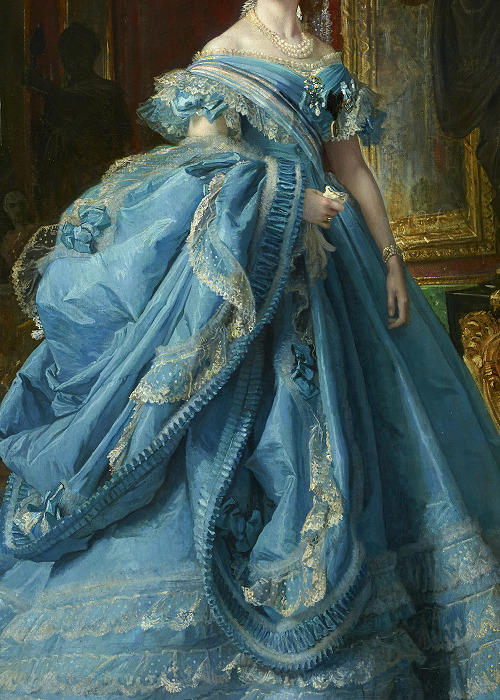
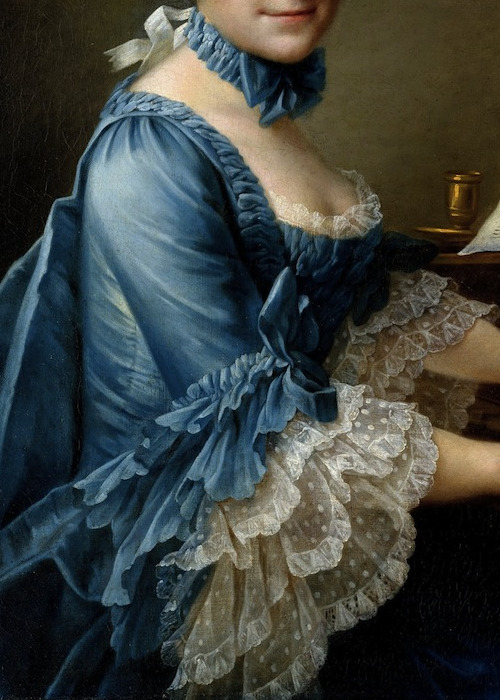
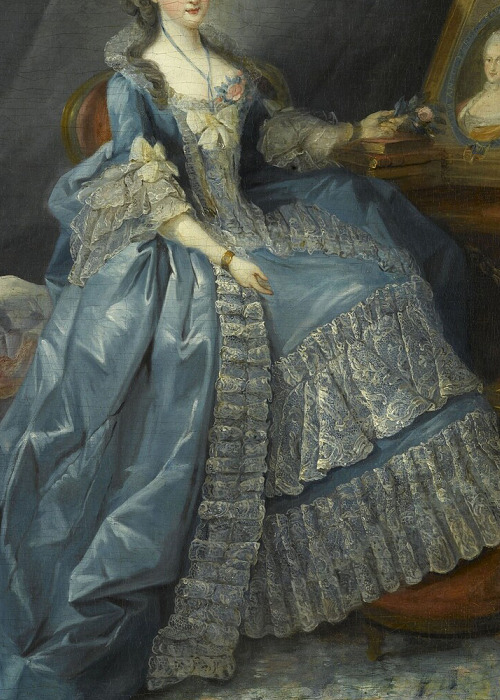
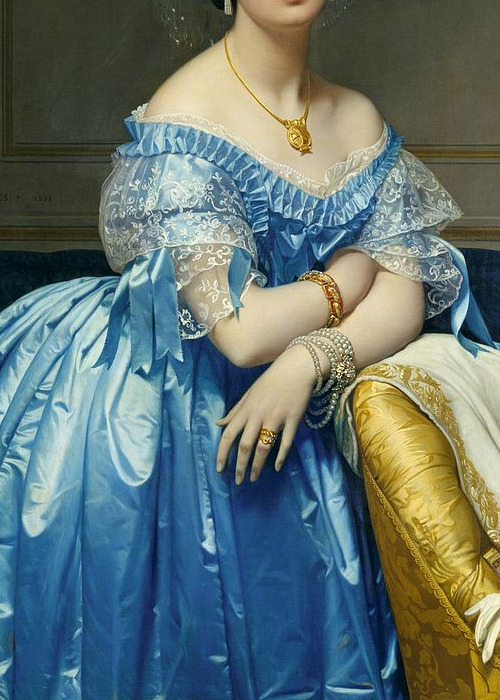
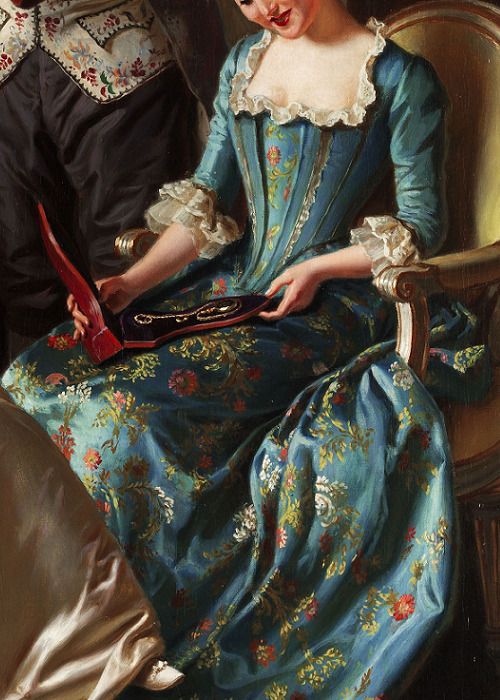
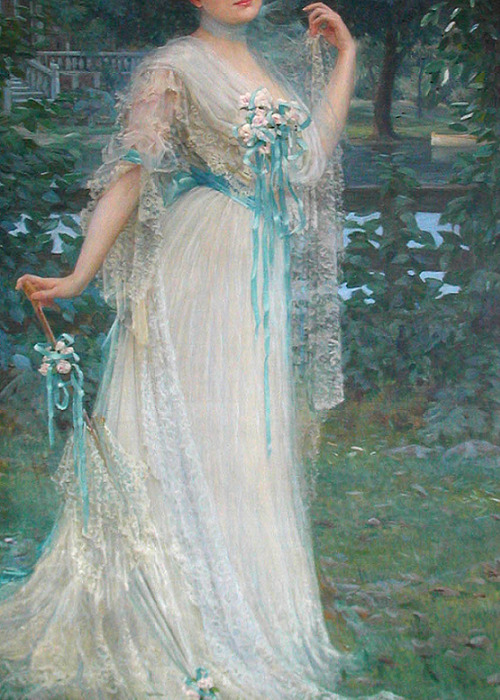
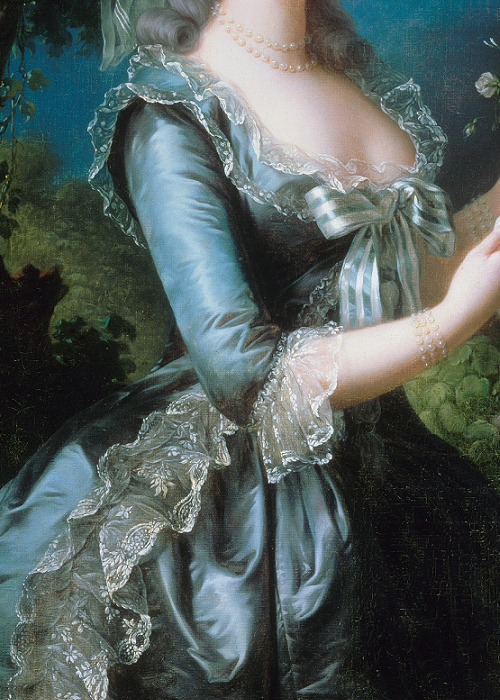
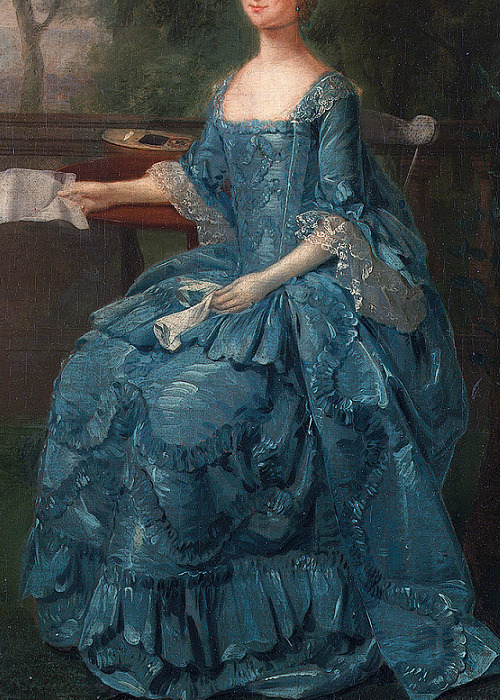
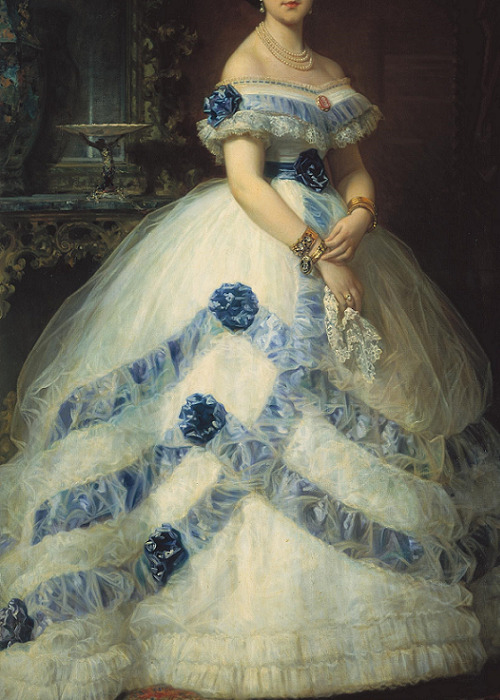
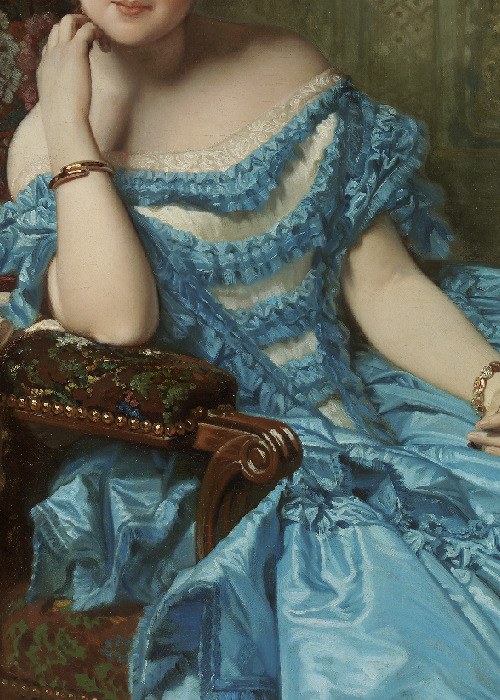
Details in Blue
Infanta Isabel de Bourbon, 1866, by Vicente Palmaroli y Gonzalez.
Madame Charles Simon Favart, 1757, by François-Hubert Drouais.
Marie-Thérèse de Savoie, 1775, by Jean-Baptiste André Gautier-Dagoty.
Princesse de Broglie, 1853, by Jean Auguste Dominique Ingres.
Admiring the Gift, by Pio Ricci.
Portrait de Philomena Lynch, 1900’s, by Paul Jobert.
Marie-Antoinette with the Rose, 1783, by Louise Élisabeth Vigée Le Brun.
Anne Streatfeild, 1756, by Arthur Devis.
María Isabel Álvarez y Montes, 1868, by Federico Madrazo.
Portrait of Amalia de Llano, 1853, by Federico de Madrazo y Kuntz.
#art#art history#art details#details#dresses#art history dresses#art history fashion#historical fashion#painting details#artwork#1800's#1700's#19th century#18th century#1900's#20th century#blue#colour blue#Vicente Palmaroli y Gonzalez#François-Hubert Drouais#Jean-Baptiste André Gautier-Dagoty#jean Auguste Dominique Ingres#Pio Ricci#english art#french art#italian art#spanish#italian#french#Paul Jobert
16K notes
·
View notes
Video
vimeo
Production company : Incendie Films Director : Jean Charles Charavin Casting : Arnaud Binard Romain Levi Aurélie Bancilhon Producer Antoine Olla Liner Producer Marie Brillant Assistant Producer Laura Bougeard 1st assistant director Tanguy Mottin 2nd assistant director Yohanne Bernard Director of photography : Ian Pompeo de Camargo 1AC : Tom Haudry 2nd assistant opérateur caméra Manon Delville Gaffer : Maxime Chastres Electrician : Nathan Jean-François Trainee Clément Schürch Grip : Hugo Rotivel Grip Assistant : Paul Le Coz Grip trainee : Maxence Parquet Location manager : Vincent Decremps Assistant location manager : Bastien Rouillet Assistant location manager : David.depetris Assistant location manager Grégoire Charavin Set Designer : Alexia Paulus Assistant set designer : Solveig Gourmelen Assistant set designer : Lise Lacoue Assistant set : designer Emma Charavin Mask up Artist : Pierre Louis Graizon Drawer : Barthélémy Belle Make-up & Hair : Marie Koleda Stylist : Pauline Robin Assistant Stylist : Gautier Krug Assistant Stylist : Solène Borsatto Editor : Stéphanie Pelissier Assistant editor : Clara Hurtado Colorist : Fernando Lui VFX : Cousin Bizarre, YSF, Adrien Renay Graphist : Nathan Almeras, Quentin Valois, Antonin Wolvs Sound designer Aristide Rosier Assistant writer Astrid Verdun Bodyguard Sylvain Abélard Bodyguard Charles Gebenholtz Arthur Mura’s Daughter Angela Mahmoudi The man with the envelope : Gabriel Greffier Special thanks : Hôtel Saint Marc, Hôtel Garden Inn Orly, Hôtel La Pinte du Nord, Aéroport d’Orly, la ville de Nogent-Sur-Marne, la ville du Perreux-Sur-Marne, Christophe Macary, Cyrille Cuvillier, Thomas Boesch, Etienne Boulanger, Cyril Cannizzo Agnès b, J.M. Weston, Husbands, Victoria Tomas, Emmanuelle Khanh, Vuarnet, Kuboraum, Arbo, Philéo, Steven Passaro, Atelier Nu, Quartier Libre
1 note
·
View note